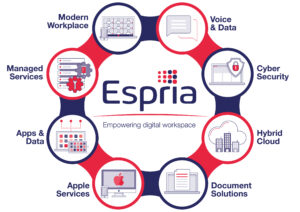With global commitments such as Net Zero becoming more of a priority in the next decade, business leaders must address whether their organisations can tick all the necessary ESG boxes in terms of their IT. Identifying particular facets of sustainability is key to this, as this may vary depending on individual businesses and needs. Thus, a wider overview of industry practices is required – which can be found when businesses look to their cloud storage and managed services provider of choice.
Once ESG targets have been set, meeting them and remaining within levels of compliance can be a real challenge when it comes to technology. If you don’t have visibility every step of the way, how can you ensure those ESG boxes remain ticked, and your technology is up to scratch? Businesses need solutions that not only solve their IT demands, but also provide a level of peace of mind that their operations are compliant, environmentally friendly, and future-proof for years to come as we move into a greener world.
Ritchie Puckey, Head of Compliance at Espria, believes that when it comes to ESG compliance, IT service providers have an obligation to lead the conversation in terms of upholding sustainable initiatives and ensuring client accountability. “From an ESG perspective, all organisations are now looking towards meeting the minimum standards of expectations. Services must be provided ethically and sustainably and evidenced as such.
“Everybody wants to do the right thing for the environment, and most importantly, businesses need to be perceived as doing the right thing. However, ensuring every section of the business is compliant with ESG regulations can be drawn out. For MSPs, compliance is a massive tick box to reassure and provide that sort of galvanisation to the end customer -that they are making sustainable and ethical decisions at every stage.
“Compliance extends to all industries. For local government, as an example, all associations must evidence the fact they are purchasing at least 20% of their technology from a sustainable and ethical supply source, to adhere to minimum standards of expectation by 2025.
Puckey believes that MSPs are in a prime position to uphold these regulations as they can unify multiple different services under one banner. “Rather than focusing on individual products or talking about the hardware, the software or the services separately, MSPs can focus on combining them all with how they can provide offerings. Providers will scrutinise the sustainability and ethics within their client operations, and as with cybersecurity, implementing full zero trust methodology, they can offer a similar process for productivity and sustainability initiatives.
“For smaller organisations, reporting the environmental impact of their supply chain and their customer base is a necessity. Implementing and using tools to aid sustainability, security and productivity reporting is important, and can all be provided by their MSP.”
Puckey further asserts that cloud storage is a key part of meeting ESG compliance, rather than something to be concerned about regarding energy consumption. “With its infrastructure designed to scale, a cloud-first approach to delivering solutions is the way to go. In a traditional model, you would have a server running in your office at 20% capacity, using power 24/7/365 and pushing out heat. Data centres are specifically designed to run and cater to multiple users and environments more efficiently, and when looking at power consumption, it’s far more efficient than many individual businesses running their own servers.”
“Service providers are investing heavily in sustainable power and renewables to power these data centres. There is even talk now of using the batteries within the data centres to feed back into the grid. Cloud has a lower reliance on hardware deployment, and therefore requires less on-site maintenance support; thus, MSPs can demonstrate to customers reduced energy use, decreased GHGs (Greenhouse gases), reduced technology waste, data centre efficiency and a shift to renewal energy resources all from a single source.”
Receiving a Judges’ Commendation in CRN’s Sustainability in Tech Awards, Espria understands its role in and the importance of sustainability to help meet global commitments such as Net Zero, whilst also providing a catalyst for growth and risk reduction. This informs how core business processes, the development of a common culture and the integration of ESG into governance can be manifested.
By offering Sustainable Assessments and implementing analytical tools and reporting metrics, Espria empowers its customers to make better decisions, automate processes and provide more data-driven sustainable solutions. Through digital transformation, Espria improves the sustainability of their clients’ businesses in a measurable and accountable way.

To read more about our ESG, please click here.

